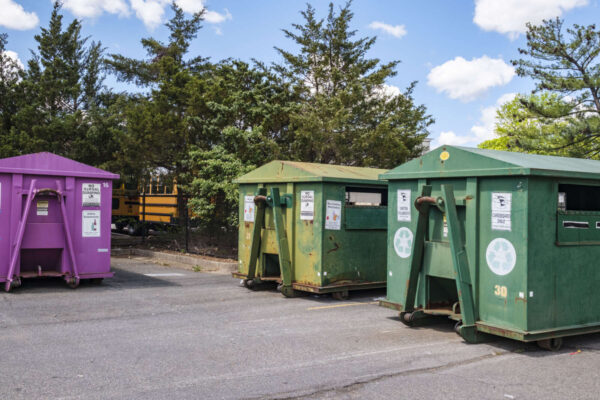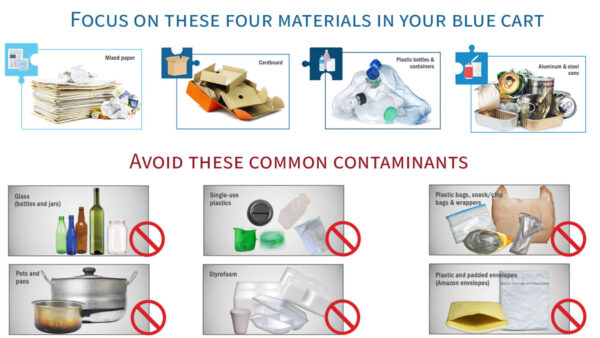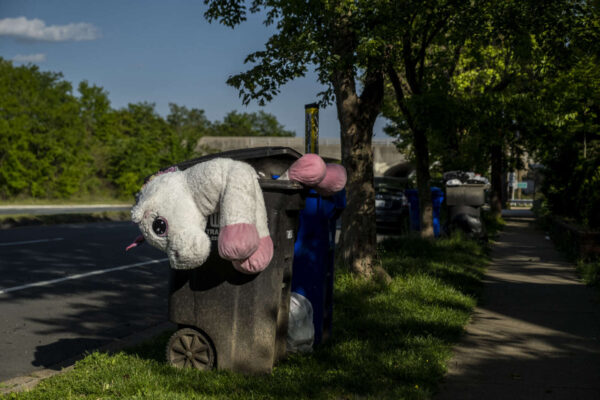
Arlington’s recycling rate is trending up — but there is still a ways to go to reach the county’s goal of diverting nearly all trash from incinerators and landfills by 2038.
In 2021, the recycling rate, which now includes the county’s new food scrap collection program, was 52.4%, according to Solid Waste Bureau Chief Erik Grabowsky. Last year’s rate is projected to be 54%.
The county’s recycling rate has risen incrementally in the last six years, from 44.5% in 2015. But residents and the government will have to double down on food scrap collection and recycling, while reducing overall waste, over the next 15 years if the county is supposed to reach its goal of diverting 90% of trash from incineration and landfills by 2038.
Grabowsky says greater participation in the county’s food scraps collection program and improved recycling habits would get the county halfway there.
“If we do a much better job of recycling and a much better job of food scrap collection, we get into the mid-to-high 70th percentile,” he said in a February meeting. “Beyond 75%, it’s a real challenge.”
To close that 15% gap, county staff, a Solid Waste Committee and local environmentalists have several ideas, including promoting reusable dishware in Arlington Public Schools and starting collections for hard-to-recycle items.
These and other ideas could be incorporated into a forthcoming Solid Waste Management Plan to replace the current one approved in 2004. This road map, which could be ready for public engagement this summer, will guide the county’s approach to waste management and could include interim milestones to make a 90% diversion rate seem manageable: a 60% diversion rate by 2028 and 75% rate by 2033.
Solid Waste Committee Chair Carrie Thompson says she likes to think of this plan as a “Zero Waste Plan,” the most important objective of which is getting all Arlingtonians on board with producing less trash.
“We’re all in this together,” Thompson tells ARLnow. “We have to be conscientious because the county can only do so much… If we all do better about what hits the bins, then what they do is more effective.”
For instance, food scraps and compostable paper comprised 26-32% of what went into the trash last year, while recyclable paper products and glass comprised about 14-16% of trash, according to data provided to ARLnow. Since 2019, residents have been asked to recycle glass separately to improve recycling quality and save the county money.
Conversely, trash and glass make up about 14% of the recycling stream and have no value, according to an updated pamphlet from Arlington County about what should and should not be recycled.
Thompson says public education in the future should focus on clearing up recycling misconceptions and targeting apartment complexes, which house the majority of Arlington residents and can receive county recycling services. The county has apartment complex-specific resources, including in Spanish.
“Consultants have led us along to a focus on public awareness about their consumption and recycling so that recycling loads are cleaner and more marketable,” she said. “Sometimes, they have to pitch whole loads if the recycling is contaminated.”

Another zero waste advocate, Liz Rubager, says residents should reframe how they think of recycling if they want to do it better.
“For recycling to work properly, everything that goes in the blue bins needs to be treated as a commodity,” she said. “Of you’re treating it as trash, it will be treated as such, and indeed it is.”
Issues with recycling quality locally and nationally, particularly when it comes to plastics, however, show Climate Change, Energy and Environment Commission Chair Joan McIntyre that people cannot rely on it as their main habit for reducing waste.
“It’s becoming clear we can’t recycle our way out of these problems,” she says. “We have to go toward a circular economy: reducing, reusing, repairing — those types of things.”
As for reuse, some advocates, including Rugaber, want to see dishwashers in school buildings, but the school system says this is easier said than done.
“We don’t have the space or the plumbing in many of our kitchens to include dishwashers,” APS spokesman Frank Bellavia tells ARLnow. “In addition to purchasing dishwashers, we would have to purchase plates and utensils. Labor is also a concern… The cost would be very high and adding the additional soap to the environment would not be a good trade off.”
Rugaber — a parent who advocates for greater waste reduction efforts in APS buildings — and Grabowsky remain optimistic.
“It’s a matter of focus and priority and willingness to take on complexity rather than dismiss things outright because it’s a challenge,” says Rubager.
In the February meeting, Grabowsky said he hopes the schools make progress on reusable dishware.
“Just like county facilities are going to have to lead by example, at some point, I think APS will have to say, ‘We need to do what’s right, from an environmental standpoint,'” he said. “When we first started with APS, we went from styrofoam trays to cardboard trays and it was kind of a similar discussion early on. Now, you’ve made that complete transition.”
APS Food Services has instead focused on compostable and recyclable trays and food containers, Bellavia. Its next step will be to divert waste with more food waste composting, which some schools are already testing out.
“We continue to look at possible options to expand this program throughout all our schools,” he said.
For now, sustainability happens on a school-by-school level, overseen by liaisons who encourage students and staff to recycle and reduce waste. Rugaber says APS needs waste reduction leadership from the top.
“It becomes a collection of interesting programs that don’t mean the county is doing anything comprehensive or with accountability — even though everyone’s heart is in the right place,” she said.
The county and volunteers are focused on voluntary recycling and composting participation and education about reducing consumption because the county cannot enact laws and it is unclear how much of a difference these make.
Unlike places like D.C., Arlington would need state legislation to require restaurants to provide disposable utensils on-demand or use compostable take out containers, for instance.
Meanwhile, the existing plastic bag tax has yet to reduce the number of plastic bags used in Arlington, according to Grabowsky.
“It’s a matter of how committed people are and the time they have,” he said. “People are willing to do other things to minimize time spent doing waste management and not-so-pleasant tasks.”


